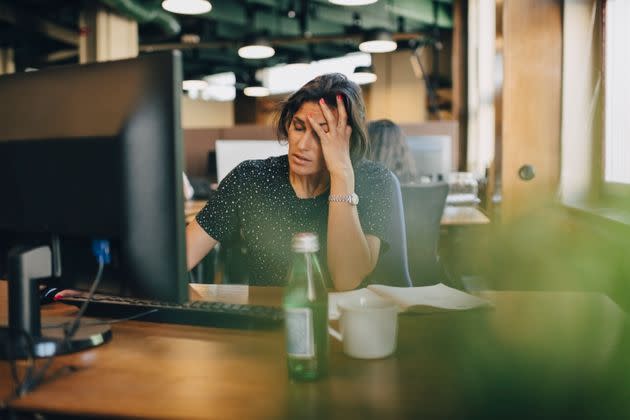Why Do I Feel Sleepy At The Same Time Every Day?

There are a few explanations for why you could be hitting the same afternoon slump each day. Thankfully, there are also several solutions.
Several days a week, when the evening comes around, I’m tired. My stomach is full from dinner, I’m relaxing with a good TV show and I could probably go to sleep if I would let myself. But going to bed at 7 o’clock? That’s too late for a nap, and too early for a night’s worth of sleep.
I found it interesting that these slumps seemed to hit around the same time consistently. I found it especially intriguing when William Seremetis posted a TikTok about his girlfriend feeling sleepy and napping between 3 p.m. and 5 p.m. every day.
Why are we so consistently tired — and to the point of needing a nap — at a specific time each day? Is there a way to beat this exhaustion? Sleep experts weigh in.
Reasons You’re Tired At The Same Time Every Day
There isn’t one definitive explanation for why you may feel tired at the same time every day; rather, a host of factors can contribute to it. Other than simply not getting enough solid sleep at night, potential aspects include:
Your Circadian Rhythm
According to Theresa Schnorbach, a psychologist and sleep scientist with the sleep company Emma, your circadian rhythm is an “internal, 24-hour timer” that’s “responsible for governing numerous physiological functions, including sleep-wake patterns.” She explained it may vary from person to person, depending on their genetics and other personal traits.
Your Daily Patterns
Along those same lines, your daily schedule and activities — e.g., work, your workout, when you settle down to read — can impact when you feel more tired versus awake. “There could be a habitual element involved, where the body ‘learns’ a routine and associates specific times with sleepiness,” Schnorbach said.
Your Chronotype
While many of us have the same awake-tired patterns — such as an energy dip around 2 p.m. — the exact times can differ. “The timing of that pattern is individual, heavily influenced by our chronotype (whether we’re ‘morning people’ or ‘night owls’ or something in between),” said Jeff Kahn, CEO and co-founder of Rise Science, makers of the sleep and energy tracker app Rise.
Health Conditions
Hypothyroidism, diabetes, chronic fatigue syndrome and hormonal imbalances can make you feel tired at specific times, too, according to Schnorbach. If you experience other symptoms, visiting your doctor is probably a good idea.
Distractions
“While the human brain is a fairly diligent time-keeper, today’s world is filled with environmental distractions that can throw off or deregulate our natural rhythm,” said Lisa Cottone, a biopsychologist with Choosing Therapy, noting things like the light from your phone and TV, jet lag, shift work and caffeine.
Lighting
As you might know all too well, we can be distracted (and kept up) by technology and lights, and at certain times more than others. For example, a nurse may be wide awake while on break at 1 a.m., under harsh lights and on her phone, but exhausted by mid-morning.
Further, the type of light you’re surrounded by can make a difference and affect your circadian rhythm. “Natural light helps to regulate energy levels, while artificial or a lack of light can disrupt them, causing unusual tiredness at specific times,” Schnorbach added.
When And How Much You Eat
Ever felt especially sleepy after Thanksgiving dinner? That’s because some meals can make you feel tired. Schnorbach explained this, saying, “Meal timing and composition can impact energy levels, as large meals might induce energy dips as a result of increased digestive efforts.” Further, certain foods can make falling asleep more difficult when eaten late at night. These include dairy products, spicy foods, sugary snacks and salty snacks.

The type of foods we eat and when we eat them can affect our energy levels.
When To Take A Nap Versus Stick It Out
The urge to take a nap hits most people during the middle of the afternoon. “Around 2 p.m., for reasons still not well-understood but likely to have an evolutionary basis, there is a dip in alertness and increased propensity to sleep,” Cottone said. “This afternoon dip is built into our biology, but does affect some people more than others.”
So, generally speaking, the “safest” time to nap — in other words, when you won’t risk messing with your nighttime sleep — is during that midday dip. For most, “this will be around 2 to 4 p.m.,” Kahn specified. “Early birds will experience their dip earlier, and night owls later.”
However, there are other pieces to consider, too, such as how much sleep you got the night before, if you’re traveling across time zones, and what time you plan to go to sleep that night, according to Cottone.
“If you didn’t get a good night of sleep the night before and are trying to correct a sleep deficit, an earlier nap may be better if you can. In fact, fall asleep before the 2 p.m. dip,” she said. “If you are planning to be up all night and are napping in preparation, a 2 p.m. or later nap may be better. If you are napping simply for enjoyment and because you can, a 10- to 20-minute nap at 2 p.m. is, on average, the ideal recipe.”
Kahn advised thinking about what you have planned for the day, too. “If you have an important call or meeting or need to be behind the wheel, you’ll need to wait for up to 90 minutes for that ‘sleep inertia’ to clear,” he said. (Sleep inertia is the state between being awake and asleep, in which you feel groggy and want to go back to sleep.)
Lastly, if you’re craving a nap in the evening, try to avoid taking one if you’re within a two- to three-hour window before bedtime, according to Carlie Gasia, a Spencer Institute-certified sleep science coach in Charlotte, North Carolina, and publishing coordinator at Sleepopolis. Otherwise, she continued, you may have difficulty falling asleep that night.
The next question: How long should the nap be, given too short a nap can feel pointless, and too long a nap can result in grogginess? You basically have two options. “A rule of thumb is to either limit your nap to 20 minutes or allow yourself to complete a full 90-minute sleep cycle,” Cottone said.
The amount of time you choose depends on a variety of factors, including what you need from the nap and how much time you have.
“A power nap of 10 to 20 minutes can provide a quick energy boost, while a standard nap of 30 to 60 minutes allows for some more benefits of a deeper sleep,” Gasia explained. “An extended nap of around 90 minutes can make up a full sleep cycle, but may result in temporary grogginess when waking.”
So while it sounds short, a power nap isn’t to be underestimated. Schnorbach said it can improve reaction times and logistical reasoning, and Kahn said it can improve your mood and provide a quick boost of alertness.

A quick walk outside can help boost your energy and alertness.
How To Reduce Sleepiness When It’s Not Time For Bed
Kahn notes an energy dip in the mid-afternoon is natural and, in some ways, inescapable. However, he and the other experts shared best practices for sleeping (and wakefulness, depending on the time of day) that can minimize your daily tiredness.
Have a regular sleep schedule
Yes, this unfortunately includes not sleeping in on your days off. According to Kahn, a good sleep schedule “means trying to wake up and go to sleep at the same times every day, even on the weekend.”
Schnorbach explained how this helps: “By keeping these [times] consistent, your body is able to ‘learn’ when sleep and wake-up times are due, which produces hormones accordingly to help ease you into these states,” she said.
Prepare your mind and body for sleep at night
A key part of good sleep hygiene is making sure sleep will be easy for you when the time comes. In other words, how can you feel more comfortable and relaxed?
“This can be simple things like ensuring your sleep environment is dark and cool, allocating time to wind down before sleep, or activities such as reading a book or taking a bath before bed,” Schnorbach suggested.
Cottone recommended meditation and deep breathing exercises to calm your mind, as well as melatonin to help your body know when it’s time for sleep.
Take a walk outside
As far as expert-backed advice on how to handle tiredness during the day, though, some outdoor exercise might be the ticket, according to Cottone.
“A simple, short, brisk walk that isn’t too intimidating can do wonders for signaling to your body that it is time to perk up,” she said. “Furthermore, if you can get outside, natural sunlight can help feed your brain’s suprachiasmatic nuclei the message that, ‘Hey, it’s daytime, time to be alert and active.’”
Grab a snack (and try to avoid caffeine)
Another during-the-day option: food. “Light is not the only zeitgeber (environmental circadian regulator); food availability and muscle movement are as well,” Cottone said. “Low blood sugar levels can make you feel sleepy, and a light, healthy snack can provide that boost of energy to get you through the afternoon dip.”
If you don’t have food nearby, check for gum. “The very act of chewing can enhance alertness,” she said. “I always keep a pack of gum in my car for long-distance driving to combat fatigue.”
What about a favorite go-to: caffeine? While tempting, it’s not a long-term solution, she said. In fact, it can lead to problems down the road as it “comes with the risk of having difficulty falling asleep later that night,” she added, noting caffeine can be in your system 10 hours later. “Moreover, you will need increasingly larger amounts of caffeine over time to reach the same level of alertness, which is not ideal as a long-term strategy for combating afternoon fatigue.”
Be mindful of how a routine can help and hurt...
… And think about that while scheduling what you’re going to do and when.
“While routine is fabulous for falling asleep at night and waking up in the morning, it may not be ideal for your afternoon dip,” Cottone said. “Pay attention to your activities and behaviors that you typically do at the time you tend to feel sleepy, and try to do a different task or activity during that time.”
She explained that switching up what you do in this way can boost alertness because it’s not as repetitive and familiar.
Consider a sleep evaluation
If those tips aren’t cutting it, a bigger sleep issue may be present. “While it is normal for most people to feel sleepy in the afternoon, it can also be a signal that you aren’t getting sufficient sleep at night,” Cottone said. “A sleep evaluation can help determine if your sleepiness is due to obstructive sleep apnea, for example, a sleep disorder that often the individual is not aware they have (it is often the bed partner that brings it to their attention).”
FYI: Sleep evaluations are typically done at sleep disorder centers, where specialists will monitor your breathing overnight.
While addressing inadequate sleep is important for your health and happiness, forget what hustle culture says and remember: You don’t need to feel guilty about needing (or wanting) to catch a few extra zzz’s.
